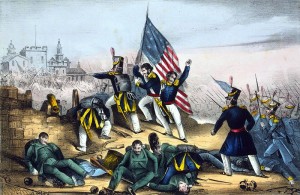 By David L. Wilson
By David L. Wilson
[Guest post by Mr. Wilson who is a graduate of the History Department at The University of Texas. We hope to feature more from Mr. Wilson in the future.]
There are very few topics in American history on which historians have not explored, researched and written about at great length. When strolling through the History section of a local bookstore or library, one can find publication after publication proffering one opinion or another on the same topics (often it seems in perpetuity). The Revolutionary Period, Jacksonian Democracy, The Civil War, The Gilded Age, The Great Depression, World War II…, the list goes on and on. As a result of the prolific research and writing on these varied (yet I would argue predictable subjects), I have often heard graduate students and historians alike groan about the lack of a compelling original research ideas that have not already been explored in great detail. University History Departments are littered with monographs focused on the most obscure and innocuous events in local histories that are destined to be read only by Graduate committees, then unceremoniously tossed away. To what end? Of course, degrees are conferred and the elusive search for tenure begins, but what contributions to the historiography of the United States have truly been made?
There is a pivotal subject in American History that has heretofore been largely ignored by historians and academe alike, The Mexican-American War. It is possible to find an occasional book or two, however a recent JSTOR Database search discovered no scholarly articles on the subject. Evidently the “publish or perish” mentality in academia has yet to motivate researchers towards this intriguing topic. I would argue that The Mexican-American War is a treasure trove of original research ideas, not only for graduate students, but also for historians, Civil War buffs, military history researchers, presidential historians, as well as those inclined towards American diplomatic history. In very broad strokes, I will highlight a couple of topics or events that I would argue require further investigation that can contribute greatly to the understanding and development of the American identity in the 19th century.
The scope and complexity of the Mexican-American war, and the events surrounding it, make for compelling research. For presidential historians, James K. Polk’s almost religious zeal for manifest destiny should be explored at great length in an effort to understand the execution of American policy during the time. For Military Historians, the amphibious landing of General Winfield Scott in Tampico is legendary. So too should Stephen Kearney’s Army of the West and their actions from New Mexico to California inspire the military minded. John C. Fremont was a character worthy of more attention. How many junior officers in the United States military have ever led an insurrection on foreign land and then summarily declared themselves the military governor of a conquered province? Fremont would later be removed and court-martialed by no other than Brigadier General Stephen Kearney after a protracted feud! Diplomatic historians would be well advised to study the doomed mission of Polk’s agent to Mexico, John Slidell. Slidell’s misunderstanding (as well as Polk’s) of the Mexican Government’s grievances and motivations moved America from a diplomatic rift over Texas, to an all out war encompassing the entire Southwestern United States. The potential influence of Great Britain in the conflict is worthy of further study as well. Some argue that Mexican debt to Great Britain established the potential for the Mexican provinces in question to be ceded to Britain in an effort to settle the debt. The Mexican-American war saw the introduction of numerous American characters that are interesting to all Civil War historians. A young Robert E. Lee makes his first appearance as part of Winfield Scott’s Army of Occupation as well as several other Civil War military leaders. An unknown congressman from Illinois is introduced to American history in his famous “Spot Speech” on the floor of the House of Representatives, that congressman was Abraham Lincoln.
The research possibilities are almost limitless on the many varied aspects of the Mexican-American war. Up until today, historians have mostly neglected this fascinating and pivotal event in American history. We would all be well advised to rectify this short-coming and begin serious scholarly research on these events so that we may have an even clearer picture not only of how The United States developed into the nation it has become, but also to honor the sacrifices of the young men who gave the ultimate sacrifice for that development.
Well done, it should peak interest in a most important event in US history that has been largely overlooked.
Pingback: Military History Carnival 22 - Thompson-Werk